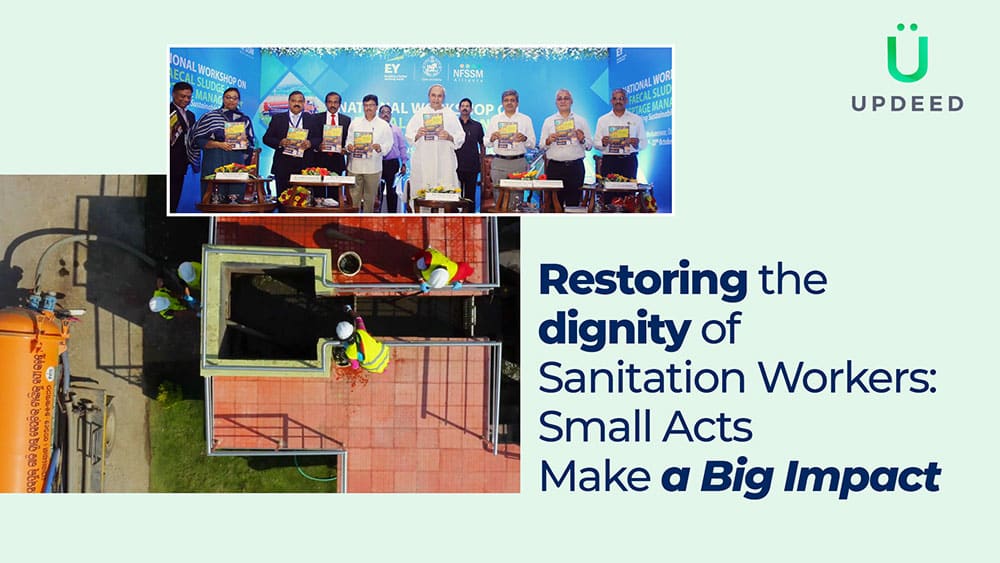Restoring the dignity of sanitation workers: Small acts make a big impact
“I used to accompany my father (a sanitation worker) to learn sanitation work at the municipality. He passed away when I was eight, and I had to join sanitation work to support my family financially immediately,” said Kanhu Naik, a sanitation worker.
Naik used to clean septic tanks manually in an unsafe environment.
“My income was never stable, and I remember spending months with less or no work. It was difficult to meet my family’s expenses, and being the only earning member added to the problems,” Naik added.
Kanhu Naik is not a case in isolation. India has approximately 5 million sanitation workers. Further, the Indian government told the Lok Sabha that in the past five years (2017-2022), at least 347 sanitation workers died in India, which made it important to focus on their safety.
Several other issues exist, and the severity of the situation calls for a collaborative effort and support to help sanitation workers out of this grim situation.

How collaborative efforts can improve the situation
Organisations working for the cause have the capability to come together and improve the situation on the ground for workers at the ground level. With this as an objective, NFSSM Alliance was created in 2016. The National Faecal Sludge and Septage Management (NFSSM) Alliance supports safe national, state and city sanitation. The Alliance is a collaborative body that drives the discourse of faecal sludge and septage management (FSSM) in India.
Under its GARIMA Scheme, the government started identifying and empowering sanitation workers by strengthening the sanitation infrastructure across the value chain. Further, the Urban Management Center (UMC), a part of the NFSSM Alliance, helped Naik and supported him and his work.
Today Naik is working as a loader for battery-operated vehicles for door-to-door collection. He is not involved in cleaning septic tanks in an unsafe environment, which risks his health.
“After implementing this scheme, I started working in a safer environment and can support my family efficiently. I have a regular source of income and can secure my family’s needs and future well,” he added.
Additionally, the NFSSM Alliance has worked with the Ministry of Housing and Urban Affairs (MoHUA) and the Department of Drinking Water and Sanitation (DWS) to create India’s first national policy on FSSM in 2017.
The case of Sheetal Bastia
Sheetal Bastia is the Secretary of Bahucharamata (a trans-Self Help Group). The SHG started with the production of home-based phenyl and soap and went on to volunteer with NGOs to raise awareness on health and sanitation.
“Our work earned us recognition from the Cuttack Municipal Corporation (CMC), and they selected us to operate and maintain the Septage Treatment Plant (SeTP) in the city,” said Sheetal Bastia.
However, this requires proper training. Hence, Ernst & Young, again a part of the NFSSM alliance, provided the group with the necessary training.
She along with her team, underwent rigorous classroom and on-site training to understand the importance of the FSSM value chain, operational components of the plant, and its functioning, periodic and daily maintenance activities for operation and maintenance, among other important aspects.
“We were also trained in sustainable business models, leadership, communication, and problem-solving, which have really helped us in our work,” she added.
“Today, each member of this SHG is financially independent and is capable of leading their life the way they want, Bastia concluded.
Way Forward
Despite the importance of their work, sanitation workers often face discrimination, poor working conditions, and low wages, which can lead to poor health outcomes and a lack of social mobility. By providing sanitation workers with fair wages, decent working conditions, and respect, we improve their lives and help empower them by attaching a sense of dignity to their lives and livelihood.
Additionally, living with dignity helps sanitation workers take pride in their work and feel valued, increasing their motivation and job satisfaction and leading to better work performance and outcomes. This eventually helps in the overall socio-economic development of the country.
Ready to make a positive impact in the world?
UPDEED is the place for you. Our free and open platform is filled with inspiring stories from individuals and organizations who are making a difference in their communities and beyond. Connect and collaborate with like-minded individuals from around the globe on UPDEED, and discover your own potential to create meaningful change. Join our community and make a difference.





